吉林大学:《英语泛读》课程电子教案(PPT课件)Lesson 6 The Missing Five-Pound Note
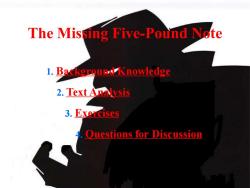
The Missing Five-Pound Note 1.Backgroun Knowledge 2.Text Analysis 3.Exercises Questions for Discussion
The Missing Five-Pound Note 1. Background Knowledge 2. Text Analysis 3. Exercises 4. Questions for Discussion
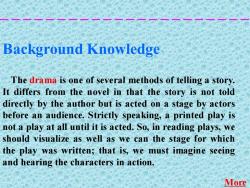
Background Knowledge The drama is one of several methods of telling a story. It differs from the novel in that the story is not told directly by the author but is acted on a stage by actors before an audience.Strictly speaking,a printed play is not a play at all until it is acted.So,in reading plays,we should visualize as well as we can the stage for which the play was written;that is,we must imagine seeing and hearing the characters in action. More
Background Knowledge The drama is one of several methods of telling a story. It differs from the novel in that the story is not told directly by the author but is acted on a stage by actors before an audience. Strictly speaking, a printed play is not a play at all until it is acted. So, in reading plays, we should visualize as well as we can the stage for which the play was written; that is, we must imagine seeing and hearing the characters in action. More
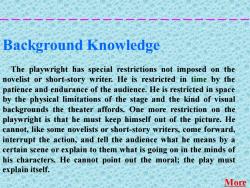
Background Knowledge The playwright has special restrictions not imposed on the novelist or short-story writer.He is restricted in time by the patience and endurance of the audience.He is restricted in space by the physical limitations of the stage and the kind of visual backgrounds the theater affords.One more restriction on the playwright is that he must keep himself out of the picture.He cannot,like some novelists or short-story writers,come forward, interrupt the action,and tell the audience what he means by a certain scene or explain to them what is going on in the minds of his characters.He cannot point out the moral;the play must explain itself. More
Background Knowledge The playwright has special restrictions not imposed on the novelist or short-story writer. He is restricted in time by the patience and endurance of the audience. He is restricted in space by the physical limitations of the stage and the kind of visual backgrounds the theater affords. One more restriction on the playwright is that he must keep himself out of the picture. He cannot, like some novelists or short-story writers, come forward, interrupt the action, and tell the audience what he means by a certain scene or explain to them what is going on in the minds of his characters. He cannot point out the moral; the play must explain itself. More
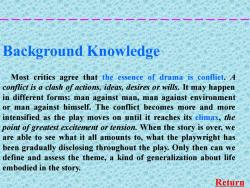
Background Knowledge Most critics agree that the essence of drama is conflict.4 conflict is a clash of actions,ideas,desires or wills.It may happen in different forms:man against man,man against environment or man against himself.The conflict becomes more and more intensified as the play moves on until it reaches its climax,the point of greatest excitement or tension.When the story is over,we are able to see what it all amounts to,what the playwright has been gradually disclosing throughout the play.Only then can we define and assess the theme,a kind of generalization about life embodied in the story. Return
Background Knowledge Most critics agree that the essence of drama is conflict. A conflict is a clash of actions, ideas, desires or wills. It may happen in different forms: man against man, man against environment or man against himself. The conflict becomes more and more intensified as the play moves on until it reaches its climax, the point of greatest excitement or tension. When the story is over, we are able to see what it all amounts to, what the playwright has been gradually disclosing throughout the play. Only then can we define and assess the theme, a kind of generalization about life embodied in the story. Return
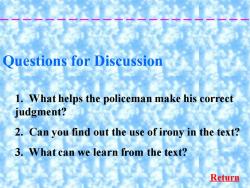
Questions for Discussion 1.What helps the policeman make his correct judgment? 2.Can you find out the use of irony in the text? 3.What can we learn from the text? Return
Questions for Discussion 1. What helps the policeman make his correct judgment? 2. Can you find out the use of irony in the text? 3. What can we learn from the text? Return
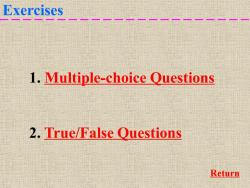
Exercises 1.Multiple-choice Questions 2.True/False Questions Return
Exercises 1. Multiple-choice Questions 2. True/False Questions Return
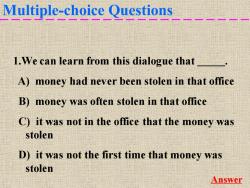
Multiple-choice Questions 1.We can learn from this dialogue that. A)money had never been stolen in that office B)money was often stolen in that office C)it was not in the office that the money was stolen D)it was not the first time that money was stolen Answer
1.We can learn from this dialogue that . A) money had never been stolen in that office B) money was often stolen in that office C) it was not in the office that the money was stolen D) it was not the first time that money was stolen Multiple-choice Questions Answer
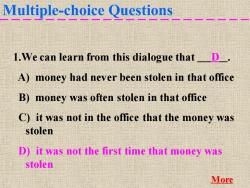
Multiple-choice Questions 1.We can learn from this dialogue thatD_. A)money had never been stolen in that office B)money was often stolen in that office C)it was not in the office that the money was stolen D)it was not the first time that money was stolen More
1.We can learn from this dialogue that D . A) money had never been stolen in that office B) money was often stolen in that office C) it was not in the office that the money was stolen D) it was not the first time that money was stolen Multiple-choice Questions More
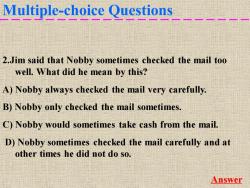
Multiple-choice Questions 2.Jim said that Nobby sometimes checked the mail too well.What did he mean by this? A)Nobby always checked the mail very carefully. B)Nobby only checked the mail sometimes. C)Nobby would sometimes take cash from the mail. D)Nobby sometimes checked the mail carefully and at other times he did not do so. Answer
2.Jim said that Nobby sometimes checked the mail too well. What did he mean by this? A) Nobby always checked the mail very carefully. B) Nobby only checked the mail sometimes. C) Nobby would sometimes take cash from the mail. D) Nobby sometimes checked the mail carefully and at other times he did not do so. Multiple-choice Questions Answer
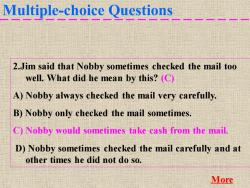
Multiple-choice Questions 2.Jim said that Nobby sometimes checked the mail too well.What did he mean by this?(C) A)Nobby always checked the mail very carefully. B)Nobby only checked the mail sometimes. C)Nobby would sometimes take cash from the mail. D)Nobby sometimes checked the mail carefully and at other times he did not do so. More
Multiple-choice Questions More 2.Jim said that Nobby sometimes checked the mail too well. What did he mean by this? (C) A) Nobby always checked the mail very carefully. B) Nobby only checked the mail sometimes. C) Nobby would sometimes take cash from the mail. D) Nobby sometimes checked the mail carefully and at other times he did not do so
按次数下载不扣除下载券;
注册用户24小时内重复下载只扣除一次;
顺序:VIP每日次数-->可用次数-->下载券;
- 吉林大学:《英语泛读》课程电子教案(PPT课件)Lesson 5 From Mr. Walton’s Diary.ppt
- 吉林大学:《英语泛读》课程电子教案(PPT课件)Lesson 4 The Winter’s Snow.ppt
- 吉林大学:《英语泛读》课程电子教案(PPT课件)Lesson 3 Your Breakfast Is Served, Madam.ppt
- 吉林大学:《英语泛读》课程电子教案(PPT课件)Lesson 2 Never Late(2).ppt
- 吉林大学:《英语泛读》课程电子教案(PPT课件)Lesson 1 Never late(1/2)(负责人:王延彬).ppt
- 大学英语综合教程III考试(Examination for English Majors)试卷B(含答案).doc
- 大学英语综合教程III考试(Examination for English Majors)试卷A(含答案).doc
- 吉林大学:《旅游英语》课程PPT教学课件(Tourism English)Unit 20 Pubicity Literature in Tourism 旅游企划宣传 unit 20-writing.ppt
- 吉林大学:《旅游英语》课程PPT教学课件(Tourism English)Unit 20 Pubicity Literature in Tourism 旅游企划宣传 unit 20-text a.ppt
- 吉林大学:《旅游英语》课程PPT教学课件(Tourism English)Unit 20 Pubicity Literature in Tourism 旅游企划宣传 unit 20- key and text b.ppt
- 吉林大学:《旅游英语》课程PPT教学课件(Tourism English)Unit 20 Pubicity Literature in Tourism 旅游企划宣传 unit 20 patterns.ppt
- 吉林大学:《旅游英语》课程PPT教学课件(Tourism English)Unit 19 The Internet and Tourism 因特网与旅游业 unit 19-patterns.ppt
- 吉林大学:《旅游英语》课程PPT教学课件(Tourism English)Unit 19 The Internet and Tourism 因特网与旅游业 unit 19- text a.ppt
- 吉林大学:《旅游英语》课程PPT教学课件(Tourism English)Unit 19 The Internet and Tourism 因特网与旅游业 unit 19 writing.ppt
- 吉林大学:《旅游英语》课程PPT教学课件(Tourism English)Unit 18 Business Letters in Tourism 旅游业务书信 unit 19 key.ppt
- 吉林大学:《旅游英语》课程PPT教学课件(Tourism English)Unit 18 Business Letters in Tourism 旅游业务书信 unit 18-text a.ppt
- 吉林大学:《旅游英语》课程PPT教学课件(Tourism English)Unit 18 Business Letters in Tourism 旅游业务书信 unit 18-patterns.ppt
- 吉林大学:《旅游英语》课程PPT教学课件(Tourism English)Unit 18 Business Letters in Tourism 旅游业务书信 unit 18-key.ppt
- 吉林大学:《旅游英语》课程PPT教学课件(Tourism English)Unit 18 Business Letters in Tourism 旅游业务书信 unit 18-dialouges.ppt
- 吉林大学:《旅游英语》课程PPT教学课件(Tourism English)Unit 17 Seeing off at the Airport 机场送别 unit 17 key.ppt
- 上海海洋大学:外语学院2011年版课程教学大纲汇编(正文).pdf
- 上海海洋大学:外语学院2011年版课程教学大纲汇编(目录).pdf
- 上海海洋大学:外语学院2018版课程教学大纲汇编(专业理论课).pdf
- 上海海洋大学:外语学院2018版课程教学大纲汇编(专业实践课).pdf
- 上海海洋大学:外语学院2018版课程教学大纲汇编(综合与通识教育课).pdf
- 上海海洋大学:外国语学院朝鲜语专业课程教学大纲汇编(2022年版).pdf
- 上海海洋大学:外国语学院大学外语类课程教学大纲汇编(2022年版).pdf
- 上海海洋大学:外国语学院日语专业课程教学大纲汇编(2022年版).pdf
- 上海海洋大学:外国语学院英语专业课程教学大纲汇编(2022年版).pdf
- 吉林大学:《大学英语》课程电子教案(PPT课件)大学英语(一)第一单元(第1-12讲).ppt
- 吉林大学:《大学英语》课程电子教案(PPT课件)大学英语(一)第二单元(第13-24讲).ppt
- 吉林大学:《大学英语》课程电子教案(PPT课件)大学英语(一)第三单元(第25-33讲).ppt
- 吉林大学:《大学英语》课程电子教案(PPT课件)大学英语(一)第四单元(第34-41讲).ppt
- 吉林大学:《大学英语》课程电子教案(PPT课件)大学英语(一)第五单元(第42-49讲).ppt
- 吉林大学:《大学英语》课程电子教案(PPT课件)大学英语(一)第六单元(第50-57讲).ppt
- 吉林大学:《大学英语》课程电子教案(PPT课件)大学英语(一)第七单元(第58-65讲).ppt
- 吉林大学:《大学英语》课程电子教案(PPT课件)大学英语(一)第八单元(第66-72讲).ppt
- 上海交通大学:《日语》课程教学资源(教学大纲)日本课程教学大纲汇编 Japanese Course Outline.pdf
- 《大学英语语法》课程电子教案(PPT课件)00 Introduction、The use of simple present.ppt
- 《大学英语语法》课程电子教案(PPT课件)01 动词的语态.ppt
